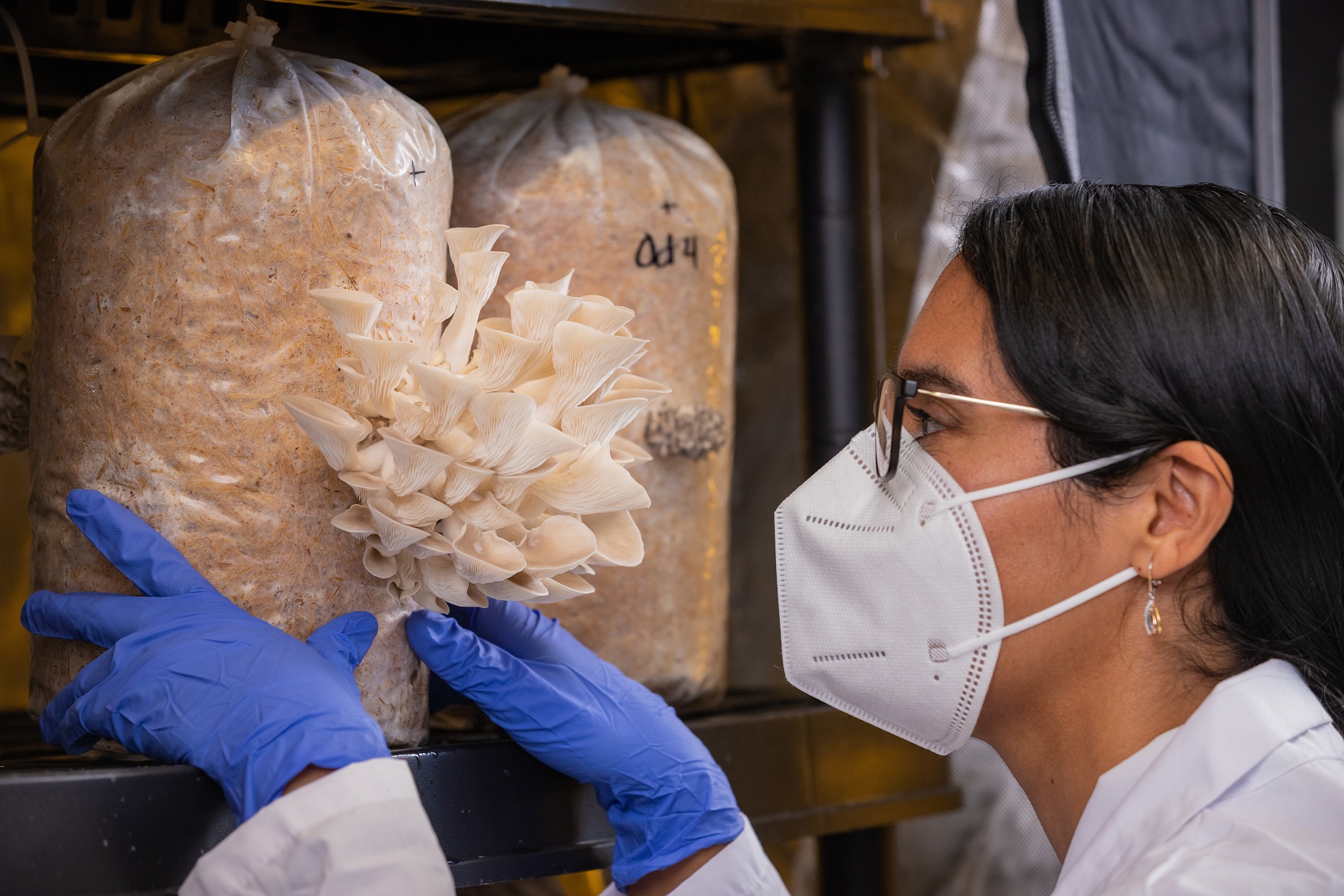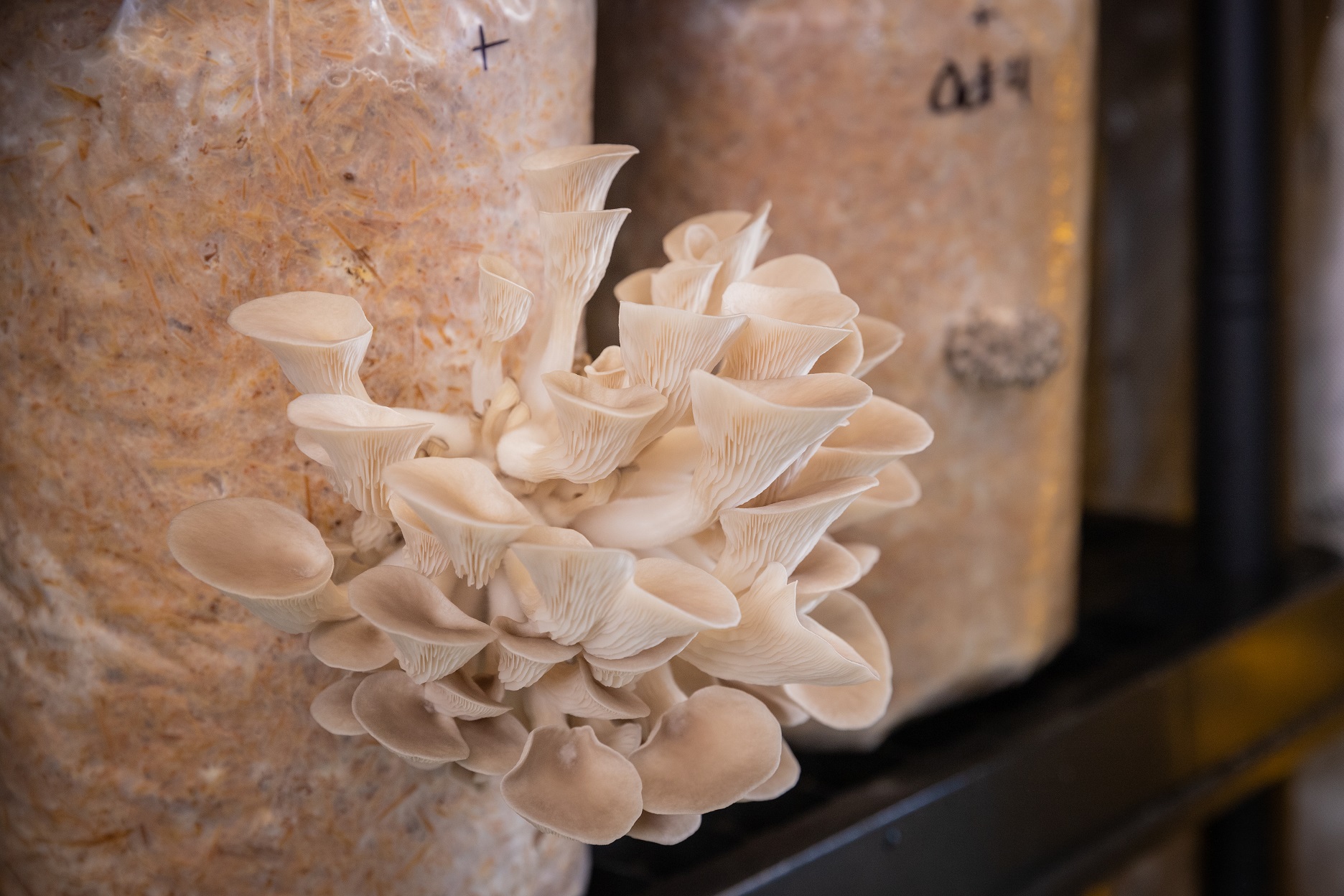
A faculty member at Lethbridge College has embarked on a new project to study sustainable growing methods for blue oyster mushrooms, while providing Culinary students the opportunity to cook with gourmet produce. Thanks to an internal research grant from the college’s Centre for Applied Research Internal Fund (CARIF), Dr. Adriana Morrell, Agriculture Sciences instructor has spent the last six months creating a mycology lab on campus to test a variety of substrates and their effects on blue oyster mushroom growth.
Morrell is using different kinds of food waste – coffee grounds to eggshells to hemp straw – to serve as the material where mushrooms are nourished and grown. Some of the most commonly used materials – or substrates – that mushroom producers typically use, such as wheat straw, sawdust or amendments such as gypsum, can be cost prohibitive. But Morrell’s research is looking at how food waste could not only replace these more expensive substrates, but also add nutrients and other benefits to a mushroom crop.
“These are things that mushroom producers are keen on learning because it could mean more yield, faster production and lower costs. Maybe you’ll get bigger mushrooms, heavier caps or better pigmentation,” says Morrell. She and her team have already seen that blue oyster mushrooms grown in coffee grounds produce a stronger hue – something that can go a long way in affecting the desirability of mushrooms sitting on grocery store shelves. The manipulation of growing parameters such as light intensity, moisture and air exchange cycles can also affect the physical look of the mushroom.
Morrell’s project is testing and comparing wheat straw versus hemp straw; gypsum versus pulverized eggshells; and the effect of other amendments such as spent brewers’ grain and coffee grounds in mushroom yield and production efficiency.
Lethbridge College Culinary students are also benefiting from Morrell’s research as it gives them a chance to handle and cook with something they might not have the opportunity to see regularly – the freshest of mushrooms. The mycology lab is producing a diversity of mushrooms for the Culinary program that includes blue oyster, pink oyster, king oyster mushrooms and others that would typically be too expensive or not commonly found for students and instructors alike.
 “What we’re trying to do is show people that there are other mushrooms beyond the usual kinds we see in the store that are so beneficial for you and your diet,” explains Morrell. “For me, the most exciting part is bringing that unknown piece to people and allowing them to try it in a better way.”
“What we’re trying to do is show people that there are other mushrooms beyond the usual kinds we see in the store that are so beneficial for you and your diet,” explains Morrell. “For me, the most exciting part is bringing that unknown piece to people and allowing them to try it in a better way.”
Additionally, Morrell’s research project offers the college’s Culinary instructors an opportunity to take students out of the kitchens for a tour to see how the mushrooms are grown and harvested.
“It’s beneficial anytime we can produce a product that we can put directly into the hands of our students,” says Doug Overes, chair of the college’s School of Culinary Arts. “The biggest benefit is when a student can see that farm-to-table, locally grown concept in action. It gives them a sense of pride to be able to say, ‘this is ours; this is Lethbridge College.’”
The college’s CARIF grants develop applied research capacity among faculty and staff at Lethbridge College by funding short-term projects and activities that align with the college’s strategic goals and priorities. These projects can be a starting point toward a long-term vision and plan for applied research, including funding from external sources. Morrell’s project is one of four CARIF-funded research projects currently underway during the 2022-23 academic year.